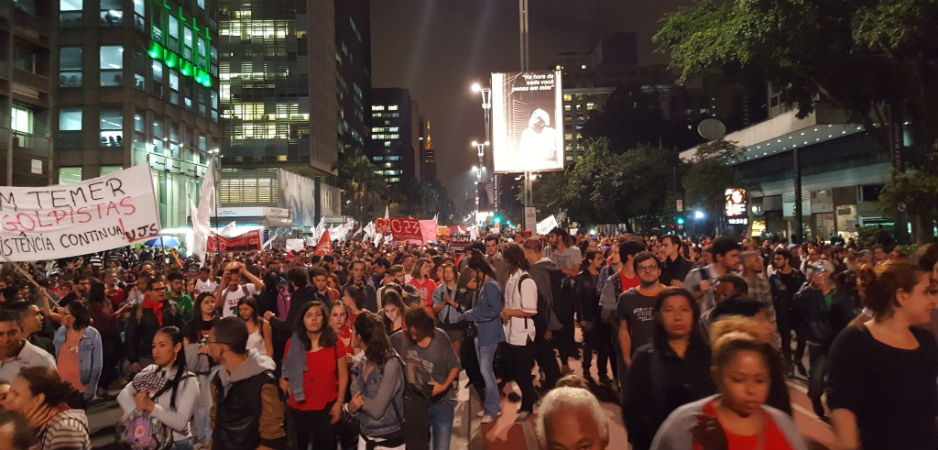A day after a mob of right-wing protesters stormed government buildings in Brasilia on January 8, sparking a mass police response and 1,500 arrests, Brazilian President Luiz Inacio Lula da Silva gathered all his government ministers and representatives of all 27 state governments in a symbolic show of unity and walked to the headquarters of the Supreme Court.
Even governors loyal to defeated ex-president Jair Bolsonaro either showed up or sent representatives. It was in Bolsonaro’s name that the protesters had stormed the presidential palace, the seat of the National Congress and the Supreme Court building, declaring that last year’s election – the closest since the end of military rule in 1985 – was a sham.
But the united front against what Lula called a coup attempt hid a darker reality: Brazil’s democracy is being killed by the people who claim to be saving it.
What Lula intended as a show of unity could also have been seen as him, his government, and executives of every state bowing to the real power in Brazil right now: the unelected Supreme Court in general and a single judge in particular named Alexandre de Moraes.
Judge, Jury and Executioner
As Lula looks on, Moraes has become Brazil’s de facto dictator. After Sunday’s riots, Moraes threatened to arrest elected officials, police and military leaders for not acting quickly enough to restore order. He made good on his threats, suspending the elected governor of the Federal District, which includes Brasilia, for 90 days, and ordering the arrest of several other officials, including the local police chief.
This action has created misgivings. “We cannot disrespect democracy in order to protect it,” Irapuã Santana, a lawyer and legal columnist for O Globo, told The New York Times.
Lula’s election to a third term as president was widely seen as a tectonic shift from right back to left in Brazilian politics. But in fact, Lula has no mandate other than as an executive in the country’s federal system of government with its three co-equal branches. No party has a majority in the Congress, though Bolsonaro’s right-wing allies gained enough seats to be the largest faction.
Moraes, backed by the court’s other judges, has interpreted his role as head of the Supreme Electoral Court and guardian of the integrity of democratic elections as a mandate to assume dramatic powers. He is decisively acting on key national issues while the other two branches are still getting organized. Moraes has become the sole judge of truth and falsehood in Brazilian political discourse.
It’s unclear whether Lula supports Moraes’ powergrab, but this veteran politician has done nothing to stop it.
A Rather Sweeping Judicial Order
On January 13, as Lula thanked workers helping repair the damage to the presidential palace, Moraes issued a sweeping order demanding six international social media companies – Facebook, Rumble, Telegram, TikTok, Twitter and YouTube – remove accounts of several individuals, including journalists and elected members of the national Congress, within two hours or face fines. This all-powerful judge then went on to demand these companies keep his order secret.
One of those banished from social media was Deputy Nikolas Ferreira — Brazil’s lower house of the National Congress is called the Chamber of Deputies. This incoming deputy is a 26-year-old Bolsonaro ally who received the most votes of anyone in October’s congressional elections. Ferreira slammed the order on his Twitter feed, which was still up a day later. “They took down all my accounts for no reason,” he said. “In the name of ‘democracy,’ they are silencing all opposition. It is forbidden to disagree in Brazil.”
This is not the first time Moraes has acted to remove elected officials from social media or banned journalists from reporting what he considers “fake news.” But for the most part, reaction to those moves has split along ideological lines. To the left and the national media, he’s a hero. To Bolsonaro’s allies, he’s Public Enemy No. 1.
The argument is that Moraes is acting to protect democracy in the face of threats of a military coup, which many of Bolsonaro’s supporters have sought. But the military, which ruled from 1964 to 1985, wants nothing to do with government after having left the nation’s economy and its own reputation in a shambles. Remember that the military voluntarily gave up power and slunk back to the barracks after disgracing itself.
Lula initially treaded carefully with the military when he came back into office. He has since changed course. On January 21, Lula sacked his own choice for army commander: General Julio Cesar de Arruda. Apparently, the general allegedly shielded the rioters in Brasilia from prosecution, and said Bolsonaro had “polluted” the armed forces. The new commander — General Tomás Miguel Ribeiro Paiva — is seen in some circles as the preferred choice of Moraes.
The influential newsmagazine Veja reported that some in Lula’s Workers’ Party see Moraes as a potential problem for the government. Many current and former military leaders see the judge’s actions as a “signal of indignation” with the state of affairs and a clear desire to assert control over the country. Meanwhile, Moraes’ reach has become so broad that many independent observers are becoming worried. “To Defend Democracy, Is Brazil’s Top Court Going Too Far?” asked The New York Times in a September 26 article.
“Is there now, or has there ever been, a modern democracy where a single judge exercises the power that Alexandre de Moraes possesses in Brazil?” journalist Glenn Greenwald asked on Twitter. Greenwald, whose husband, David Miranda, is also a deputy in the National Congress from a left-wing party, exposed the judge’s order on his podcast.
How Did Brazil Get Here?
Moraes was elevated to the Supreme Court in February 2017, a month after his predecessor, Teori Zavascki, was killed in a plane crash. Zavascki had been the court’s liaison in the massive Lava Jato (Car Wash) scandal that had ensnared hundreds of Brazilian politicians, including Lula and his political protégée and successor, Dilma Rousseff. Corruption, including vote-buying, had been the engine that kept Brazil’s democracy from gridlocking in a system where dozens of political parties of all sorts of ideological orientations were represented in the National Congress but none of them had a majority.
Rousseff was impeached and removed from office in 2016 for reasons unrelated to the scandal. This move was widely seen as engineered by Michel Temer, who was her vice president and also under investigation but went on to replace Rousseff as president. Moraes became Temer’s justice minister after having been defense lawyer for Eduardo Cunha, the former president of the lower house of Congress who was convicted of corruption in 2017. Cunha and Temer were both from the Brazilian Democratic Movement Party.
The impeachment of Rousseff was condemned by many on the left as a “coup,” and the anger only grew when Lula was sentenced to nine years and six months in prison for corruption and money-laundering. Sergio Moro, the federal judge who had launched the Lava Jato investigation and supervised the prosecution, passed the sentence. This left many on the left feeling that Moro had exceeded his authority as an unelected judge by his excessively aggressive prosecution of popular politicians.
Lula’s conviction left him unable to run in the 2018 election, which he had been widely expected to win. Instead, Bolsonaro, up until then the leader of a fringe right-wing party based in Rio de Janeiro, came to office on a wave of public outrage over the scandal. Moro became Bolsonaro’s justice minister.
After leaked messages emerged that Moro had colluded with prosecutors in Lula’s case, the Supreme Court overturned Lula’s conviction and restored his political rights. This March 2021 decision cleared the way for Lula to challenge Bolsonaro, who had been weakened by his inability to tackle corruption as promised. Bolsonaro also was dogged by accusations that he and his family were just as corrupt as the other politicians he criticized. He was also widely seen as having badly bungled Brazil’s response to COVID-19 as thousands died while he underplayed the risks from the virus.
After his loss, Bolsonaro was unable to gain support among the political class for his claims the election was rigged. After all, many of his allies had won in the same elections and his party had become the largest faction in the National Congress since the 1990s. Cannily, Bolsonaro flew to Florida on the day before the handover of power on January 1 to avoid demands from within the Workers’ Party that he be arrested and investigated for corruption, and for claiming the election was a fraud.
Though Bolsonaro has been silent about the events of January 8, Moraes has opened a criminal probe into whether the former president was responsible. Officials have even held out the possibility that Brazil may ask the United States to extradite him. At the same time, the Supreme Court ordered the arrest of Anderson Torres, who had replaced Moro, now a senator, as justice minister. Torres became head of public security in Brasilia after Bolsonaro left office and was accused of allowing the protests to happen.
It’s unclear how this will end. When Telegram refused the judge’s order to block Ferreira’s account, Moraes fined the social media outlet 1.2 million reais (about $237,000). Meanwhile, in the National Congress, Moraes is facing at least 60 demands for his impeachment, largely from Bolsonaro’s allies. However, Brazilians are now so deeply divided that the country is almost ungovernable. Alarmingly, there is no significant support for standing up against an action that might be breaking the democratic order. This gives Moraes a free hand and he continues to feel justified in his actions.Given the zeitgeist, Moraes is not just issuing edicts and passing sentences. In a recent speech, Moraes lambasted the January 8 rioters: “These people are not civilized. Just look what they did.” This crusading judge went on to say, “The Supreme Court, I am absolutely sure, with legal support, with our constitution, and the Federal Police, will punish everyone responsible.” It seems disinformation and political violence are not the only two threats facing Brazilian democracy, judicial authoritarianism might be the new cat on the prowl.
The views expressed in this article are the author’s own and do not necessarily reflect Fair Observer’s editorial policy.
Support Fair Observer
We rely on your support for our independence, diversity and quality.
For more than 10 years, Fair Observer has been free, fair and independent. No billionaire owns us, no advertisers control us. We are a reader-supported nonprofit. Unlike many other publications, we keep our content free for readers regardless of where they live or whether they can afford to pay. We have no paywalls and no ads.
In the post-truth era of fake news, echo chambers and filter bubbles, we publish a plurality of perspectives from around the world. Anyone can publish with us, but everyone goes through a rigorous editorial process. So, you get fact-checked, well-reasoned content instead of noise.
We publish 2,500+ voices from 90+ countries. We also conduct education and training programs
on subjects ranging from digital media and journalism to writing and critical thinking. This
doesn’t come cheap. Servers, editors, trainers and web developers cost
money.
Please consider supporting us on a regular basis as a recurring donor or a
sustaining member.
Will you support FO’s journalism?
We rely on your support for our independence, diversity and quality.









